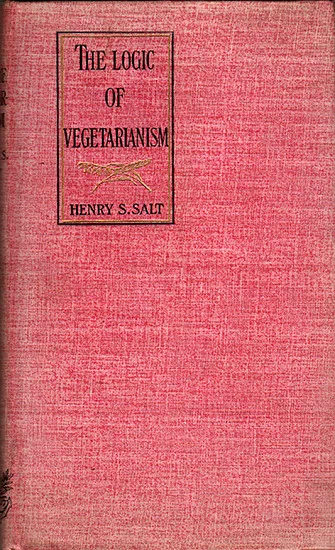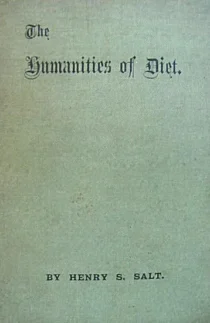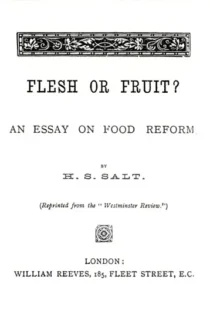
The Logic of Vegetarianism, Essays and Dialogues
Henry S. Salt
- Edition: First Edition
- Publisher: Idea Publishing Union Ltd., London
- Published: 1899
- Length: 119 pages
- Format: Hardback
- Second Edition
- 1906 George Bell & Sons Ltd., London, Hardback, 116 pages
- Third Edition
- 1933 London Vegetarian Society, 54 pages
Summary
The Logic of Vegetarianism by Henry S. Salt is a rigorous and comprehensive exploration of the arguments in favour of adopting a vegetarian lifestyle, addressing moral, scientific, economic, health, social, and aesthetic reasons for doing so. First published as part of the Vegetarian Jubilee Library, this book systematically debunks 31 common anti-vegetarian arguments—many of which, according to Salt, are so weak they verge on the humorous, yet still persist in modern discourse.
In the preface to a later edition, Salt reflects on the reviews from the book’s first release seven years prior. He notes that, while some critics accused him of constructing weak opposition in his dialogues, every anti-vegetarian argument included in the book had been presented in earnest by real opponents of vegetarianism. Salt also points out the absurdity of some criticisms, such as the suggestion from The Spectator that he had failed to address the fate of the Esquimaux.
Salt’s work not only offers a thorough defence of vegetarianism but also highlights the illogical nature of many objections, from “meat has always been eaten, and always will be” to citing historical figures like Wellington and Gladstone who ate meat without apparent harm. Through this engaging and sometimes humorous dissection of the case against vegetarianism, Salt encourages readers to rethink long-held assumptions and consider the rational, ethical path to food reform.
This book remains a key text for those interested in the philosophical underpinnings of vegetarianism and offers an entertaining yet profound critique of the arguments that continue to surface against it.
The arguments or claims made by opponents of vegetarianism:
1. Consuming eggs and diary products contradicts the meaning of “vegetarian.”
2. There is no difference between roasting an ox and boiling an egg.
3. Vegetarians who do not immediately and completely shun all animal products are hypocrites.
4. No great empires (Roman, British) were ever founded by vegetarians.
5. Human canine teeth prove the necessity of flesh-eating.
6. The human stomach is much different than that of true herbivore.
7. History shows that humans are omnivorous.
8. Vegetarianism is contrary to the laws of nature, red in tooth and claw; to kill is natural.
9. It is necessary to destroy life in order to live.
10. Raising food animals in pleasant conditions and killing them painlessly is not cruel.
11. Eating animals is no worse than using them for labour.
12. The rapid death of food animals is preferable to the agonising death of humans.
13. Food animals, free of the fears and dangers experienced by wild animals, are happier.
14. It is better for animals that we use them for food than that they do not exist at all.
15. Vegetarians who eat eggs and dairy products are inconsistent.
16. Consistent vegetarians could never kill lice or germs.
17. Flesh-eating is just as aesthetic as vegetarianism.
18. Vegetarians are sentimentalists.
19. Meat eating is necessary for strength.
20. Flesh-food is easier digested than vegetarian food.
21. Flesh diet is necessary in cold climates (“What would become of Eskimoes if all became vegetarians?”).
22. What difference does it make whether we eat flesh or non-flesh, so long as the spirit in which we eat be a proper one?
23. Vegetarianism is economically impractical.
24. Vegetarianism is an inconvenient diet.
25. Eating flesh is necessary for developing a manly spirit.
26. How could we exist without leather? Soup? Candles?
27. How could land be fertilised without manure from food animals?
28. If the life of animals be regarded as sacred as human life, civilisation will revert to a primitive condition.
29. If we turn loose all the food animals they will over-populate, overrun the land, starve, lie dead on highways and in the suburbs.
30. We were given permission by God to eat animals.
31. Vegetarians do not give sufficient priority to more important social reforms (war, poverty, etc.).
Contents
- Preface
- Introductory
- Why "Vegetarian"?
- The Raison D'Être of Vegetarianism
- The Past and Present of Vegetarianism
- Structural Evidence
- Digestion
- Conditions of Climate
- The Appeal to Nature
- The Humanitarian Argument
- Palliations and Sophistries
- The Consistency Trick
- The Degradation of the Butcher
- The Æsthetic Argument
- The Hygienic Argument
- Flesh-Meat and Morals
- The Economic Argument
- Doubts and Difficulties
- Bible and Beef
- The Flesh-eater's Kith and Kin
- Vegetarianism as Related to Other Reforms
- Conclusion
- Appendix
- Index
Reviews
- The Logic of Vegetarianism The Vegetarian Messenger and Health Review, 1906
- The Logic of Vegetarianism The Occult Review, December 1908
- The Logic of Cannibalism The Daily News, April 10, 1906




